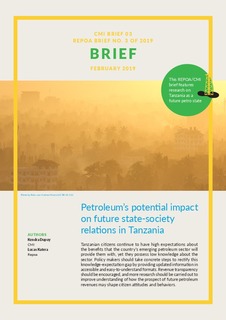| dc.contributor.author | Dupuy, Kendra | |
| dc.contributor.author | Katera, Lucas | |
| dc.date.accessioned | 2019-05-10T14:00:09Z | |
| dc.date.available | 2019-05-10T14:00:09Z | |
| dc.date.issued | 2019-05-01 | |
| dc.identifier | oai:www.cmi.no:6851 | |
| dc.identifier.citation | Bergen: Chr. Michelsen Institute (CMI Brief no. 2019:03) 4 p. | |
| dc.identifier.issn | 0809-6732 | |
| dc.identifier.uri | http://hdl.handle.net/11250/2597289 | |
| dc.description.abstract | Tanzanian citizens continue to have high expectations about the benefits that the country’s emerging petroleum sector will provide them with, yet they possess low knowledge about the sector. Policy makers should take concrete steps to rectify this knowledge-expectation gap by providing updated information in accessible and easy-to-understand formats. Revenue transparency should be encouraged, and more research should be carried out to improve understanding of how the prospect of future petroleum revenues may shape citizen attitudes and behaviors. | |
| dc.language.iso | eng | |
| dc.publisher | Chr. Michelsen Institute | |
| dc.relation | CMI Brief | |
| dc.relation | 2019:03 | |
| dc.relation.ispartof | CMI Brief | |
| dc.relation.ispartofseries | CMI Brief no. 2019:03 | |
| dc.relation.uri | https://www.cmi.no/publications/6851-petroleums-potential-impact-on-future-state-society-relations-in-tanzania | |
| dc.title | Petroleum’s potential impact on future state-society relations in Tanzania | |
| dc.type | Report | |
